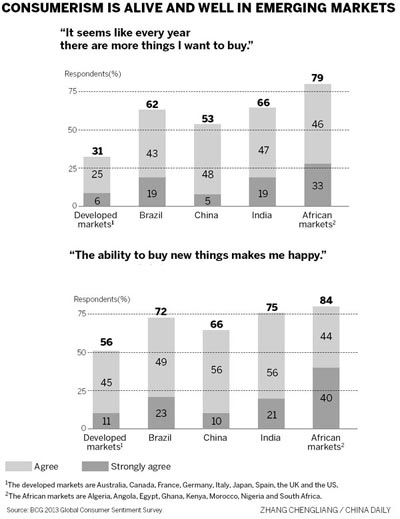
Urbanization is definitely the buzzword of the year. Premier Li Keqiang has stressed on several occasions that urbanization will create China's biggest domestic demand. At the year-end Urbanization Work Conference chaired by President Xi Jinping in mid-December last year, a quality-based, human-centered and green urbanization target was also highlighted.
From a policy perspective, this newspaper has reported extensively throughout the whole year on the topic. Institutional barriers for better urbanization such as the hukou (household registration) system, rural land regime and local government fiscal power restraints have been analyzed carefully. Today, however, we would like to focus more on the grass-roots level, of how the grand strategy affects people's everyday lives and how enormous business potential will be created. Our onsite studies showed that the impact is real and all-encompassing.
It is also worth noting that the demand from urbanization should not be the only dimension when we talk about urbanization.
Giving migrant workers equal access to education, healthcare and social security in cities could unleash their demand for goods as they feel safer spending. But these rights should also be their inherent rights. Equal social entitlement is not only an economic issue, but also a social issue.
Cities owe them because for too long, they contributed greatly to the city's prosperity but have seldom enjoyed the prosperity created by them. Now, it is time to pay the historical debt and deliver a more solid base for China's economy as well.
As elsewhere in the world, huge populations in poor countries, as China once was, is always a heavy burden. But once the country gets rich, the previous "burden" turns out to be a blessing, when rich people spend.
The story in China is even more exciting because it has the largest population in the world, and it is urbanizing fast. Even as the past decade has witnessed the great leap forward in China's urbanization process, nearly a half of the population is still in the countryside.
Foreign consumer brands have long since identified the importance of the Chinese market, as demand growth in their home markets slumped. They realized as more rural people moved to the cities, aspiring for a bourgeois lifestyle, the Chinese market could be a lifeblood for their business success, even for their survival in the coming decade.
But most foreign and domestic high-end brands have tapped only into first- and some second-tier Chinese cities. A vast number of cities such as Nanning are still largely untapped. There is, despite the perceived low purchasing power, a more important reason facing potential buyers of products: a very limited option of things to purchase. The prosperity of copycat brands has demonstrated opportunities exist. Foreign brands that are able to deliver quality products and unique experiences can gain a strong position.